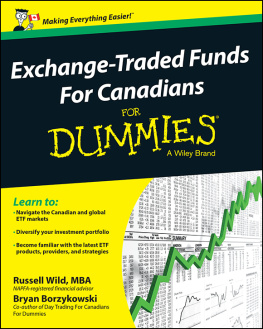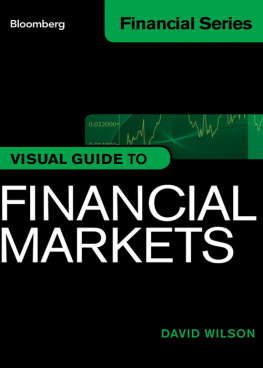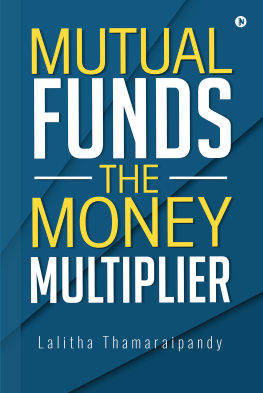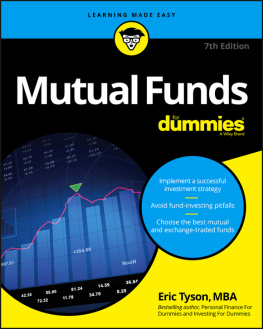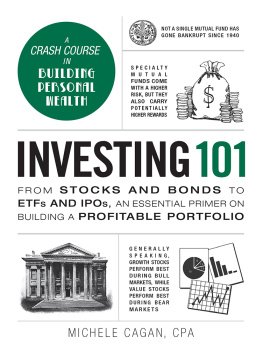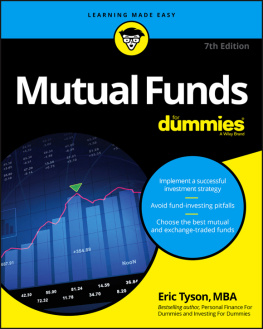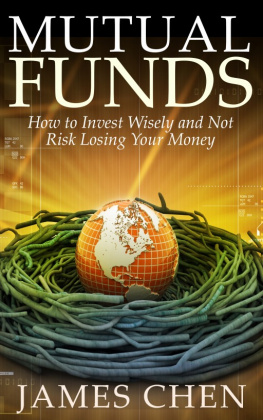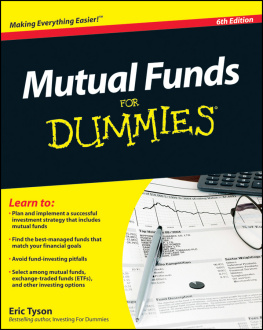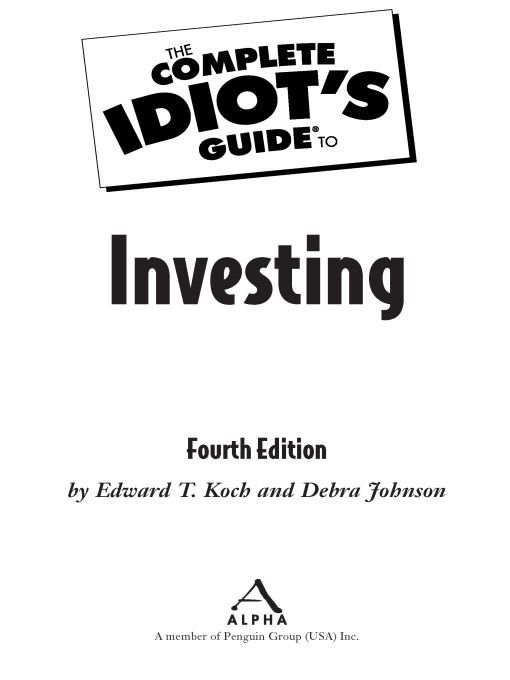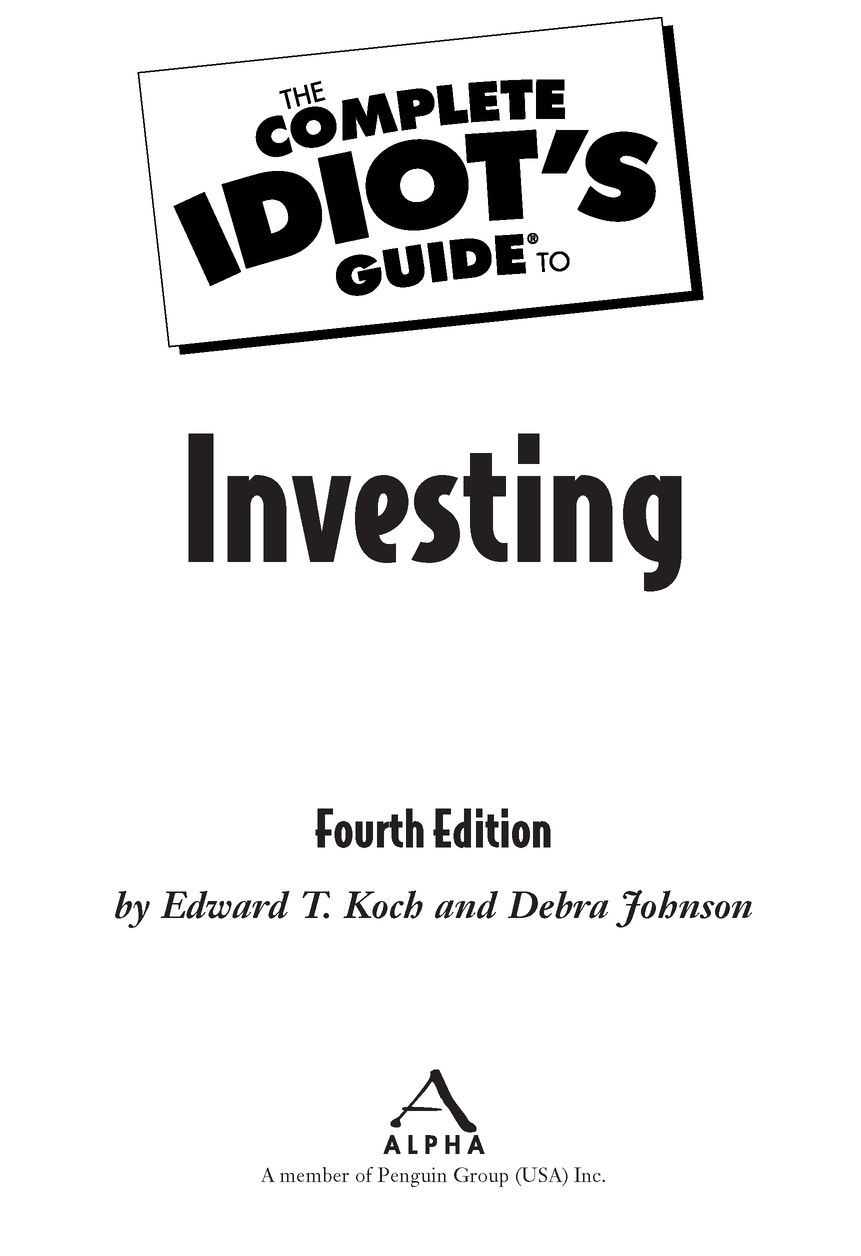Table of Contents
There is no dignity quite so impressive, and no independence quite so important,
as living within your means.
Calvin Coolidge
Introduction
If our nations financial crisis has left you reeling and freaked out, youve come to the right place. First, take a deep breath. Second, dont do anything with your investments until youve read this book. Shedding what investments you may have out of panic is not a wise course of action. Remember the Great Depression? Or Black Monday, the stock market crash of 1987? In both cases, investors who sold their holdings when the market bottomed out suffered horrific losses. They thought they were doing the right thing by cutting their losses. In most cases, if they had simply held on to their portfolios, they would have seen the value of their holdings not only fully recover, but multiply into significant wealth over time. Yes, the stock market is volatile, but over the long run, even with the most severe crashes factored in, a sturdy, well-diversified portfolio can be expected to return about 8 percent per year. So sit tight.
We all have friends who freak out over the stock market constantly. Guess what? Freaking out doesnt make your investments grow one bit faster. And freaking out can cause you to make very bad decisions.
Watching your investments rise or fall each day can be a very emotional experience, like betting at the racetrack or rooting for your favorite sports team. Theres nothing wrong with that, if you can keep a single day or event in perspective. But most of us cant. We allow our decision-making to be influenced by the previous days wins or losses. Winners become elated (and reckless); losers become depressed (and overly cautious).
This is not the way to approach investing, unless you are investing merely for entertainment. If you are investing to meet financial goals, you must not let investing become your own personal emotional roller coasterespecially when times are tough.
Start by becoming an intelligent investor, not a trader. Traders live and die on the gains and losses they experience each day. You are in this for the long haul, so forget about day tradingthats an emotional game. If you need some drama in your life, go to the racetrack; its a lot cheaper!
To become an intelligent investor, start thinking in 10-year time chunks. Heres the best piece of advice we can give you: dont look at the price of your stocks and/or mutual funds every day. If youre a long-term investor, why do you care what happened yesterday? If youre at a cocktail party and people ask you how your stocks are doing, just say, I dont know; Ill check at the end of the month. Wont that get their attention! If you build a sturdy portfolio based on the principles in this book, you will stay calm, cool, and collected, no matter what the market does from day to day.
If you are new to investing, youve come to the right place. Despite what you may be feeling, given recent events, investing is the key to making dreams come true. Dont avoid it out of fear. You may have tried to tackle investing before and had a bad experience with a blowhard for a financial advisor or a tedious, confusing book. If you threw up your hands in frustration and said Forget it! but cant get rid of the nagging feeling that youre missing out on something very important, dont despair. We wrote this book for you.
This book assumes you know less than nothing about investing, but doesnt patronize you by telling you what to do. Instead, we offer you a step-by-step guide so that you can figure out exactly what investment strategies will work for your situation:
How much you need to save to put the kids through college and retire happily
How much risk you can take on and still sleep at night
How to create a balanced portfolio of investments tailored to your financial goals
How to manage your investments from year to year and still roll with lifes changes
Questionnaires, worksheets, dreadful jokestheyre all in here. Its best to start at the beginning and work through to the end, but feel free to skip around until you get comfortable. Youll find everything you need in this book to become someone who can make intelligent, disciplined investing decisions. Heres the gist .
Part 1, What Does Financial Security Mean to You?, helps you figure out exactly that, because theres no point in investing without specific goals. Youll also take a risk-tolerance questionnaire and create your own income statement and balance sheet. Youll learn how to answer basic questions such as, If I want to have $100,000 in five years and I can earn a 10 percent return, how much do I need to invest annually? We also look at what caused the financial crisis of 2008 and explain the basics behind the government bailout.
Part 2, Creating a Plan, is based on the premise that you have to know what youve got before you can get any more. Here, youll take a close look at your job benefits and find out how to trim your taxes, so you can keep more of what you earn. Well also work on reducing spending and getting a grip on debt.
Part 3, Investing 101, is a primer in the basics. Everything you ever wanted to know but felt too stupid to ask, from what theyre really up to on Wall Street to how to pick a mutual fund.
Part 4, Rolling with Lifes Changes, confronts the inevitable upheavals many investment books ignore. Sure, you can steadily sock away dollars in your investment plan when life is smooth, but what about when you get married, get divorced, have kids, buy a house, or change jobs? This part contains event-specific advice so that no matter what life throws at you, your investments keep growing.
Part 5, Advanced Investing Strategies, is for readers who want to explore more complicated, alternative investments. Its also a source of answers for questions you may have when you hear words like option or futures contract bandied about.
In addition, you get a comprehensive glossary with clear, straightforward definitions of investment terms and an appendix with some recommendations for further reading and financial exploration.
One caveat: although we have made every effort to confirm our data, accidents do happen. Equally important to keep in mind is that tax laws are under constant revision, reinterpretation, and so on. As a result, please double-check with the appropriate sources (e.g., the IRS or your accountant) before taking any course of action.
Extras
If youre more a scanner than a reader, youll appreciate our sidebars. These explain confusing jargon, help you avoid expensive mistakes, and offer super inside strategies. Look for the following boxes:
Fiscal Facts
These little boxes contain just-for-fun facts about the financial world. Great for cocktail party chatter.
definition
Yes, investing has its own language, but its not hard to learn. Peek in this box for clear, succinct explanations of any italicized terms.


